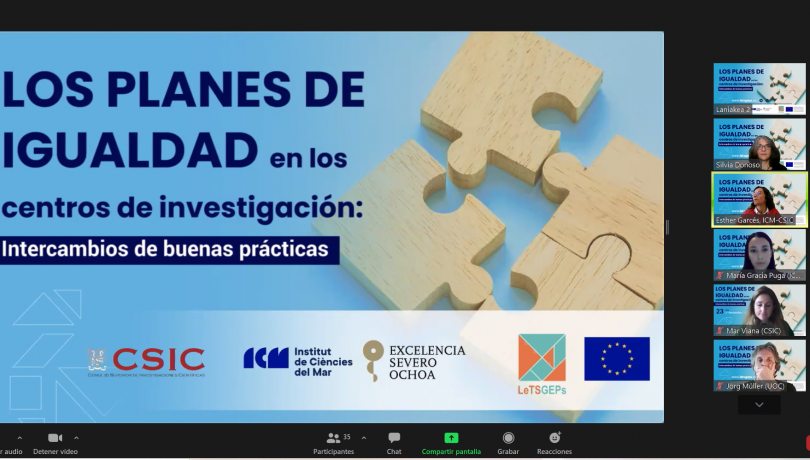The ICM organized a meeting to share good practices in the field of equality in research centres that brought together fifty people.

The Institut de Ciències del Mar (ICM) organized and hosted a meeting between several research centres to promote good practices in gender equality. The meeting, which was held yesterday online, brought together around fifty people.
The event was organised as part of the activities planned within the framework of the European project Leading Towards Sustainable Gender Equality Plans in Research Institutions (LeTSGEPS) in which the ICM participates. This initiative aims to promote the design and implementation of gender equality plans that articulate measures to drive systemic institutional change and promote the tackling of gender biases.
Exchange of good practices
During the event, participants shared experiences and good practices in relation to the integration of effective gender equality in research centres with the aim of providing references and guidance to centres wishing to align themselves with this commitment. The participants also emphasised the need to have their own equality plans in line with European regulations, as is the case of the ICM.
"The implementation of equality plans in research centres is crucial for the achievement of gender equality," states Esther Garcés, the lead researcher of the LeTSGEPs project at the ICM, who advocates the application of equality measures taken at the institutional level and the integration of the gender perspective in research to achieve effective equality.
This is a commitment that goes far beyond the ICM, as the European Commission has made gender equality one of its priorities in research. "Currently, the European agenda demands that the gender perspective and the sex variable be fully integrated into the research projects of the Horizon Europe programme," recalls Silvia Donoso, the gender expert at the ICM.
A space for analysis and reflection
The first part of the event was attended by Jennifer Dahmen-Adkins, from the Institute of Sociology at the RWTH Aachen University (Germany) and expert of the LeTSGEPs project, who introduced the topic of prioritising gender equality in European projects. For his part, UOC researcher Jörg Müller reflected on the importance of having a community of practice to address the issue of gender equality in research centres. Finally, Mar Viana, from IDAEA-CSIC, explained some good practices related to gender equality in her centre.
During the second part of the meeting, three discussion groups were opened in which the need to comply with the European guidelines that seek to guarantee effective gender equality in research centres was highlighted, as well as the need to incorporate the gender dimension and the sex variable in research. Networking, as a means to generate knowledge and to exchange good practices, was also highlighted, as well as the fundamental role played by the equality committees in the centres.
Among the conclusions of the event were the need to incorporate gender equality into the institutional agendas of research centres; the urgency of valuing the voluntary work carried out by the equality committees and their contribution to the centres; the need to accompany these efforts with expert staff in the field of equality; and the need to have gender equality plans that respond to the particular characteristics of the centres and to provide them with the necessary resources for their implementation.